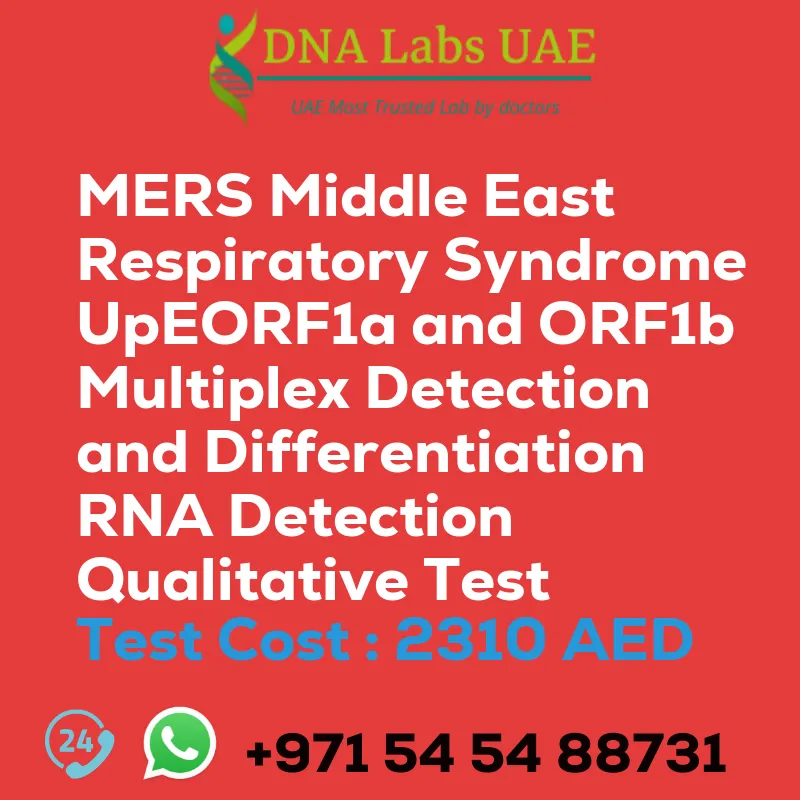MERS Middle East Respiratory Syndrome UpEORF1a and ORF1b Multiplex Detection and Differentiation RNA Detection Qualitative Test
Test Name: MERS Middle East Respiratory Syndrome UpEORF1a and ORF1b Multiplex Detection and Differentiation RNA Detection Qualitative Test
Components: Sputum, throat and nasal swabs in viral transport medium, or lung tissues, Cell Cultures, Respiratory swab, and endotracheal aspirate material, serum stool and feces, ETC
Price: 2310.0 AED
Report Delivery: 4th Working Day Email: 48 hours. On phone: 36 hours
Method: Real Time PCR
Test type: Viral
Doctor: Physician
Test Department: Genetics
Pre Test Information: Need to sign Consent document and bring any clinical history of patient for MERS (Middle East Respiratory Syndrome) (UpE, ORF1a & ORF1b) Multiplex Detection and Differentiation (RNA Detection) Qualitative Test
Test Details
The MERS (Middle East Respiratory Syndrome) (UpE, ORF1a & ORF1b) Multiplex Detection and Differentiation (RNA Detection) Qualitative Test is a diagnostic test used to detect and differentiate the Middle East Respiratory Syndrome (MERS) virus.
MERS is a viral respiratory illness caused by the MERS-CoV (Middle East Respiratory Syndrome Coronavirus). This test specifically targets three regions of the MERS-CoV genome, namely UpE, ORF1a, and ORF1b. By detecting the presence of viral RNA in a patient’s sample, the test can determine if the patient is infected with the MERS-CoV.
The test is performed using a multiplex detection method, which means it can simultaneously detect multiple target regions of the viral genome. This allows for a more accurate and efficient diagnosis. The test is qualitative, meaning it can determine the presence or absence of the virus in the patient’s sample, but it cannot quantify the viral load.
Overall, the MERS (UpE, ORF1a & ORF1b) Multiplex Detection and Differentiation (RNA Detection) Qualitative Test is an important tool in the diagnosis and surveillance of MERS-CoV infections. It helps healthcare professionals identify and differentiate MERS cases from other respiratory illnesses, allowing for appropriate patient management and control measures to be implemented.
| Test Name | MERS Middle East Respiratory Syndrome UpEORF1a and ORF1b Multiplex Detection and Differentiation RNA Detection Qualitative Test |
|---|---|
| Components | |
| Price | 2310.0 AED |
| Sample Condition | Sputum, throat and nasal swabs in viral transport medium, or lung tissues, Cell Cultures, Respiratory swab,and endotracheal aspirate material ,serum stool and feces,ETC |
| Report Delivery | 4th Working Day Email : 48 hours.On phone : 36 hours |
| Method | Real Time PCR |
| Test type | Viral |
| Doctor | Physician |
| Test Department: | Genetics |
| Pre Test Information | Need to sign Consent document and bring any clinical history of patient forMERS (Middle East Respiratory Syndrome) (UpE,ORF1a & ORF1b) Multiplex Detection and Differentiation (RNA Detection) QualitativeTest |
| Test Details |
The MERS (Middle East Respiratory Syndrome) (UpE, ORF1a & ORF1b) Multiplex Detection and Differentiation (RNA Detection) Qualitative Test is a diagnostic test used to detect and differentiate the Middle East Respiratory Syndrome (MERS) virus. MERS is a viral respiratory illness caused by the MERS-CoV (Middle East Respiratory Syndrome Coronavirus). This test specifically targets three regions of the MERS-CoV genome, namely UpE, ORF1a, and ORF1b. By detecting the presence of viral RNA in a patient’s sample, the test can determine if the patient is infected with the MERS-CoV. The test is performed using a multiplex detection method, which means it can simultaneously detect multiple target regions of the viral genome. This allows for a more accurate and efficient diagnosis. The test is qualitative, meaning it can determine the presence or absence of the virus in the patient’s sample, but it cannot quantify the viral load. Overall, the MERS (UpE, ORF1a & ORF1b) Multiplex Detection and Differentiation (RNA Detection) Qualitative Test is an important tool in the diagnosis and surveillance of MERS-CoV infections. It helps healthcare professionals identify and differentiate MERS cases from other respiratory illnesses, allowing for appropriate patient management and control measures to be implemented. |








